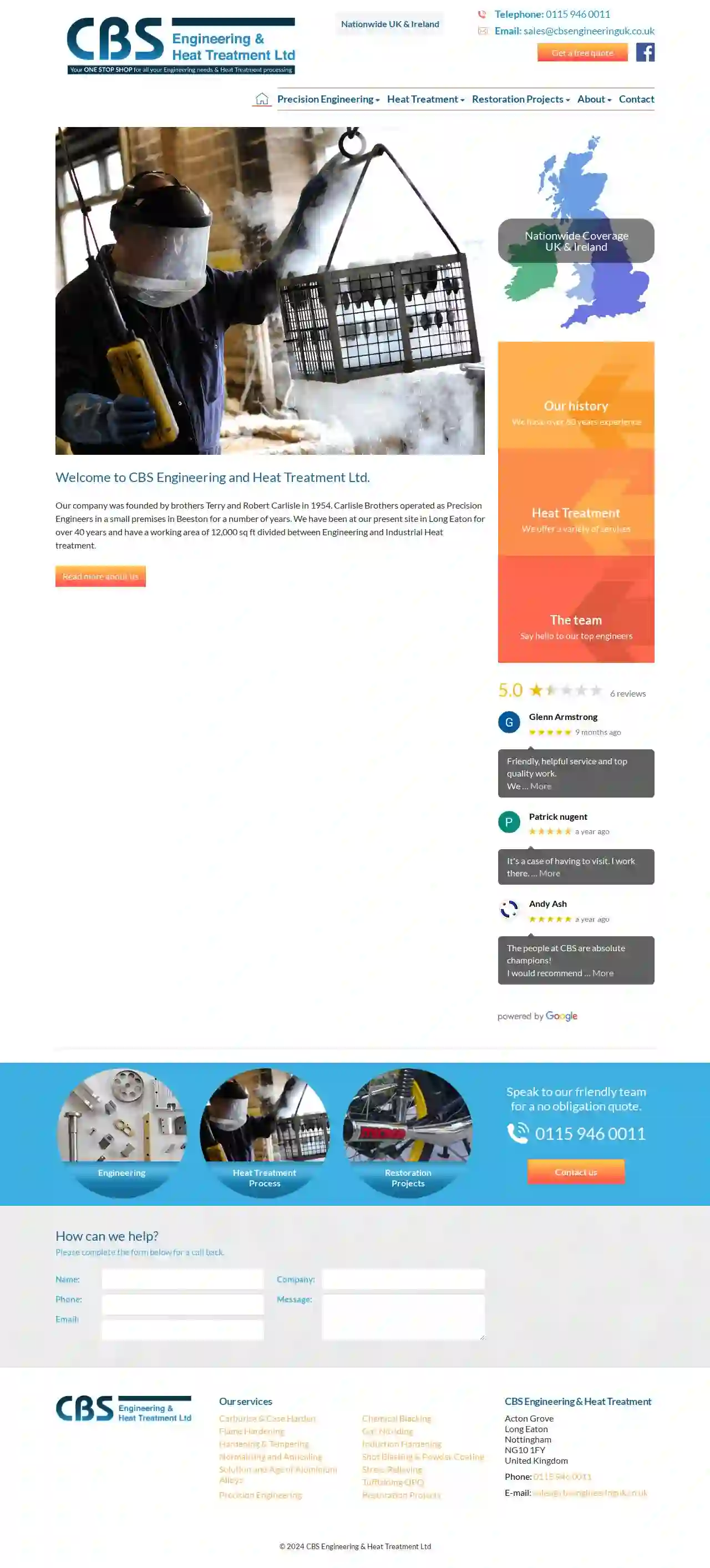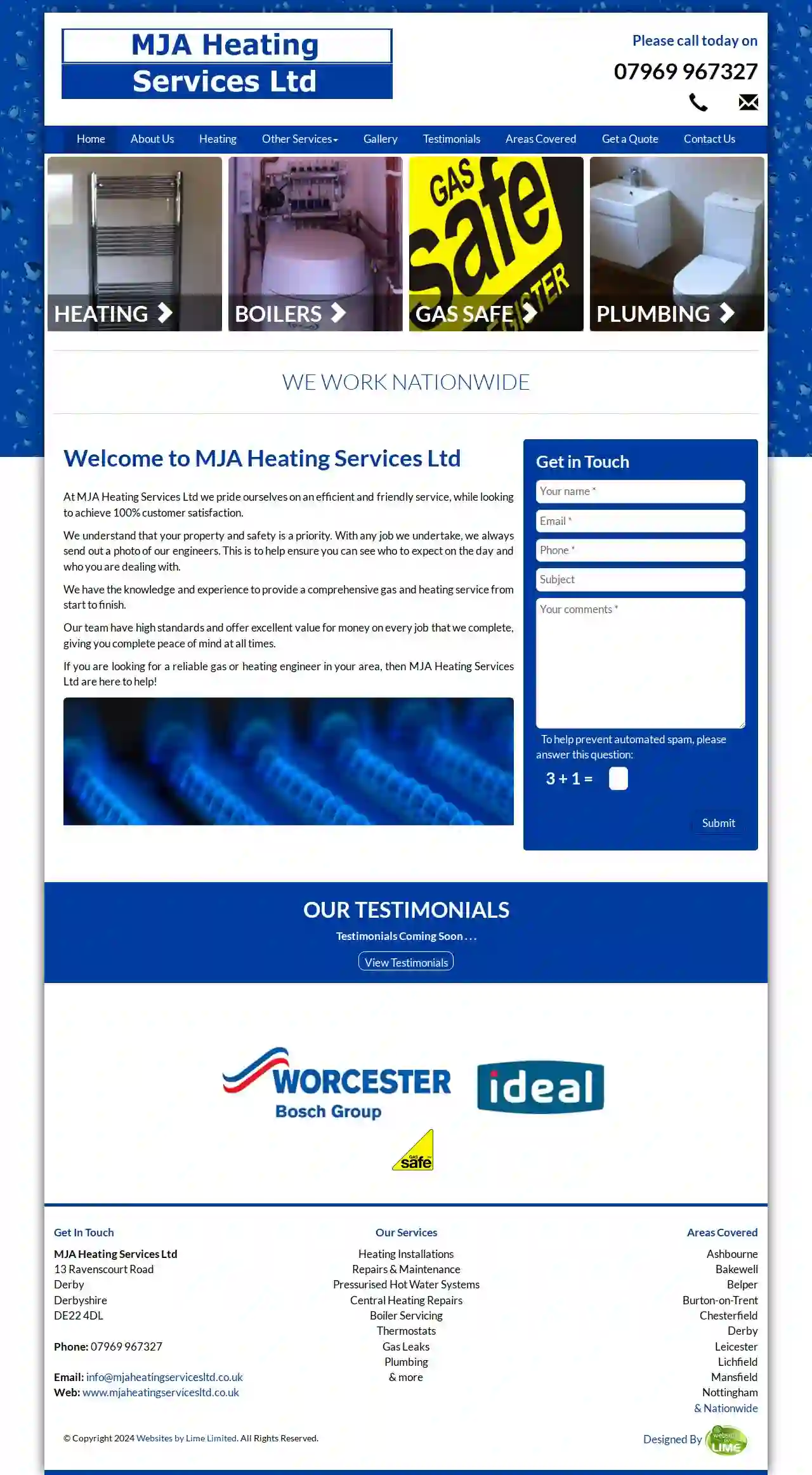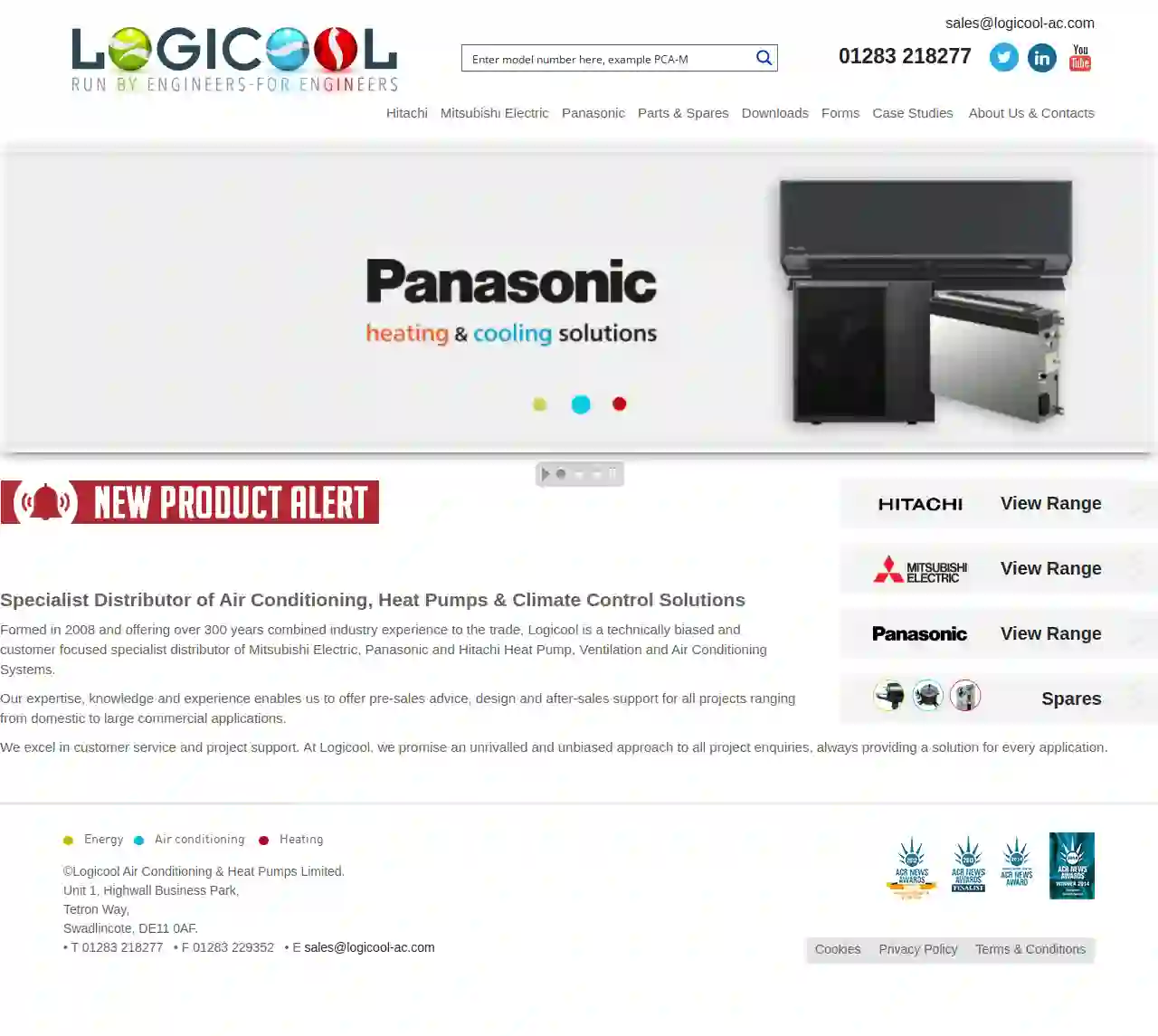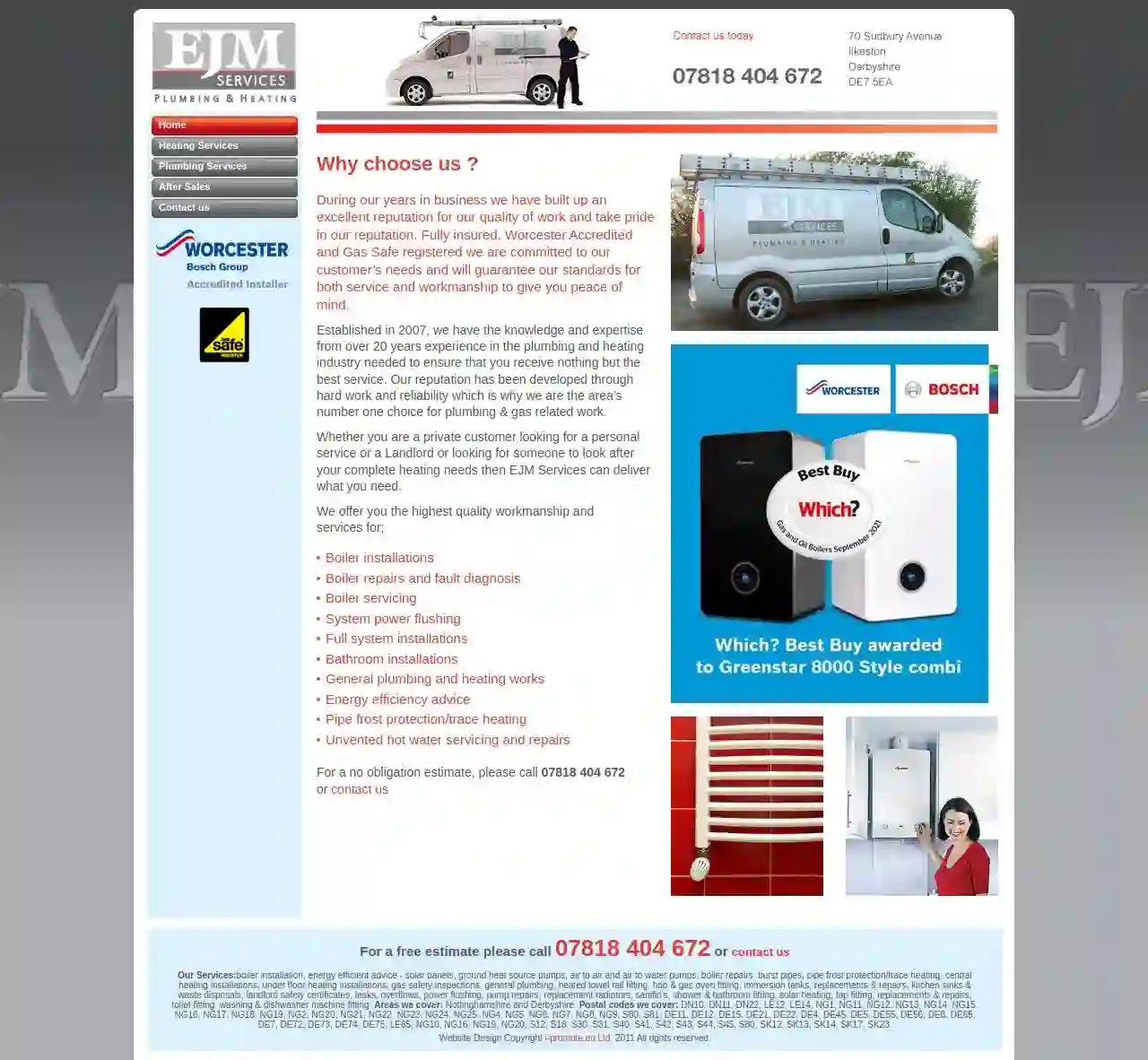HVAC Companies Swanwick
Top 10 HVAC Services in Swanwick
Get 3 FREE Air Conditioning Services quotes for your project today! Compare profiles, reviews, accreditations, portfolio, etc... and choose the best service.

Holden Heating Ltd
4.26 reviewsLong Eaton, GBEstablished since 2010, Holden Heating is a trusted name in the East Midlands for all your heating and plumbing needs. We pride ourselves on providing cost-effective, reliable services to both domestic and commercial clients. Our team of certified and qualified engineers has the knowledge and expertise to handle any job, big or small. We are committed to delivering exceptional customer service and ensuring your complete satisfaction. Whether you require a new boiler installation, a simple repair, or a full bathroom refit, Holden Heating is here to help. We are proud to be the area's number one choice for plumbing and gas related work, thanks to our hard work, reliability, and dedication to quality. Our reputation speaks for itself, with countless satisfied customers throughout the region. Contact us today for a free, no-obligation estimate or to book an appointment. We look forward to serving you!
- Services
- Why Us?
- Our Team
- Testimonials
- Gallery
Get Quote
Andy Taylor Gas Services Ltd
534 reviewsRichmond Avenue, Sandiacre, NG10 5GY, GBTaylor Gas Services is a family-run business with over 20 years’ experience in all aspects of gas, plumbing and heating. We pride ourselves on a high quality of service, genuine advice and friendly, safe experience throughout. We now accept credit/debit card payments for hassle free payments. We work at the cutting edge of boiler technology and with the earliest boilers and fires; always offering genuine advice and refusing to give up on anything because of its age. With an early background in the industrial sector of the plumbing world, we have vast knowledge of all types of heating systems and have over 20 years’ experience. Taylor Gas Services does not believe that there are any gas or plumbing problems; only solutions.
- Services
- Why Us?
- Gallery
Get Quote
C B S Engineering and Heat Treatment Ltd
56 reviewsLong Eaton, Nottingham, Acton Grove, NG10 1FY, GBWelcome to CBS Engineering and Heat Treatment Ltd. Our company was founded by brothers Terry and Robert Carlisle in 1954. Carlisle Brothers operated as Precision Engineers in a small premises in Beeston for a number of years. We have been at our present site in Long Eaton for over 40 years and have a working area of 12,000 sq ft divided between Engineering and Industrial Heat treatment. Read more about us. Nationwide Coverage UK & Ireland. Our history We have over 60 years experience. Heat Treatment We offer a variety of services. The team Say hello to our top engineers.
- Services
- Why Us?
- Our Team
- Testimonials
- Gallery
Get Quote
MJA Heating Services Ltd
3.73 reviews13 Ravenscourt Road, Derby, DE22 4DL, GBAt MJA Heating Services Ltd we pride ourselves on an efficient and friendly service, while looking to achieve 100% customer satisfaction. We understand that your property and safety is a priority. With any job we undertake, we always send out a photo of our engineers. This is to help ensure you can see who to expect on the day and who you are dealing with. We have the knowledge and experience to provide a comprehensive gas and heating service from start to finish. Our team have high standards and offer excellent value for money on every job that we complete, giving you complete peace of mind at all times. If you are looking for a reliable gas or heating engineer in your area, then MJA Heating Services Ltd are here to help!
- Services
- Why Us?
- Gallery
Get Quote
TitanFlameltd-Glossop
51 reviews175 High St W, Glossop, SK13 8HJ, GBTitan Flameltd is a local plumbing emergency call out service with over 20 years of experience in plumbing and heating. We strive to complete every job with the highest skill and best customer service. Our team of emergency plumbers and heating engineers are available 24/7 to provide fast, reliable solutions. We offer a range of services including appliance installation, bathroom plumbing, emergency plumbing, immersion heaters, kitchen plumbing, outdoor plumbing, tap repair and install, pipe repair, boiler installation and repair, water heater installation and repair, radiator installation and repair, gas line installation and repair, furnace installation and repair, heat pump installation and repair, drain cleaning, plumbing repairs, pipe installation and repair, water treatment, and sewer line repair and replacement. We are available 24/7 and offer quick appointments, fast, efficient services, and expert support when you need it most.
- Services
- Why Us?
- Gallery
Get Quote
Gasfituk
4.34 reviews128 Nottingham Road, Nottingham, NE10 2EN, GBWelcome to Gasfituk, a Local firm offering gas, plumbing and heating services trading on a good reputation throughout the Nottingham and Derby Area. We take great pride in our ability to offer you a wide range of different services being competitively priced and providing a clean, reliable, fast and efficient service. We are specialists in gas, plumbing and heating, and our highly trained and experienced gas safe engineers specialise in the service, repair and installation of all gas appliances.
- Services
- Why Us?
- Gallery
Get Quote
Logicool Air Conditioning & Heat Pumps Ltd
4.18 reviewsTetron Way, Unit 1, Highwall Business Park, Swadlincote, DE11 0AF, GBFormed in 2008 and offering over 300 years combined industry experience to the trade, Logicool is a technically biased and customer focused specialist distributor of Mitsubishi Electric, Panasonic and Hitachi Heat Pump, Ventilation and Air Conditioning Systems. Our expertise, knowledge and experience enables us to offer pre-sales advice, design and after-sales support for all projects ranging from domestic to large commercial applications. We excel in customer service and project support. At Logicool, we promise an unrivalled and unbiased approach to all project enquiries, always providing a solution for every application. Energy Air conditioning Heating ©Logicool Air Conditioning & Heat Pumps Limited. Unit 1, Highwall Business Park, Tetron Way, Swadlincote, DE11 0AF. • T 01283 218277 • F 01283 229352 • E [email protected] Terms & Conditions Privacy Policy Cookies Product Enquiry
- Services
- Why Us?
- Gallery
Get Quote
Andrews Sykes Hire Ltd.
54 reviewsUnit 1, 10-12, Nottingham Business Park, Nottingham, NG1 1AA, GBAndrews Sykes is a global company with a unique 165-year history of providing bespoke HVAC and pumping solutions nationwide, 24/7. We are the UK’s leading provider of temporary heating, cooling, and pumping equipment, with a wide range of products to suit all needs. Our team of experts is dedicated to providing our customers with the highest quality service and support.
- Services
- Why Us?
- Gallery
Get Quote
EJM Services
52 reviews70 Sudbury Avenue., Ilkeston, DE7 5EA, GBDuring our years in business we have built up an excellent reputation for our quality of work and take pride in our reputation. Fully insured, Worcester Accredited and Gas Safe registered we are committed to our customer’s needs and will guarantee our standards for both service and workmanship to give you peace of mind. Established in 2007, we have the knowledge and expertise from over 20 years experience in the plumbing and heating industry needed to ensure that you receive nothing but the best service. Our reputation has been developed through hard work and reliability which is why we are the area’s number one choice for plumbing & gas related work. Whether you are a private customer looking for a personal service or a Landlord or looking for someone to look after your complete heating needs then EJM Services can deliver what you need.
- Services
- Why Us?
- Accreditations
- Gallery
Get Quote
Hevasure
51 reviewsStancliffe House, Whitworth Road, Darley Dale, DE4 2HJ, GBHevasure is a company that specializes in providing remote monitoring technology for closed water systems in buildings. Their technology helps to prevent corrosion and ensure the longevity of HVAC systems. They offer a range of services, including monitoring, maintenance, and repair. Hevasure's technology is designed to provide real-time data and alerts, allowing building owners and facilities managers to take proactive measures to prevent corrosion and ensure the optimal performance of their systems.
- Services
- Why Us?
- Gallery
Get Quote
Over 12,692+ HVAC Contractors in our network
Our HVAC contractors operate in Swanwick & surroundings!
HVACCompaniesHub has curated and vetted Top HVAC Businesses near Swanwick. Find a reliable pro today.
Frequently Asked Questions About HVAC Companies
- Experience and Expertise: Look for installers with experience and a good understanding of AC systems.
- Licensing and Insurance: Make sure the installer is licensed and insured to work in your area.
- Reputation and Reviews: Check online reviews and ratings from other customers.
- Detailed Quotes: Get itemized quotes outlining all costs associated with the installation.
- Warranties: Inquire about warranties on equipment and labor.
- References: Ask for and check references from past customers.
- Communication: Choose an installer who communicates clearly and promptly.
- Climate: Heat pumps are generally more efficient in moderate climates, while furnaces are better for colder regions.
- Budget: The upfront cost of different systems can vary significantly.
- Energy Efficiency Goals: Higher-efficiency systems are usually more expensive upfront but result in lower energy bills over time.
- Home Size and Layout: The square footage and layout of your home affect the system's capacity and ductwork requirements.
- Existing Ductwork: If you have existing ductwork, you'll need a system compatible with it.
- What is the source of the problem? Get a clear explanation of the issue and what caused it.
- What are my repair options? Discuss different repair solutions, if applicable, and their associated costs.
- Are there any preventative measures I can take? Find out if there are steps you can take to prevent future problems.
- Do you recommend a repair or replacement? If repairs are extensive or the system is old, consider replacement.
- What are the warranties on parts and labor? Understand the warranties before agreeing to any repairs.
- Do you have any customer reviews or testimonials I can check? Reputable HVAC technicians are often happy to provide references or direct you to customer reviews.
What is a SEER rating, and why is it important?
What should I look for when hiring an AC installer?
What type of HVAC system is best for my home?
What should I ask an HVAC technician during a service call?
What is a SEER rating, and why is it important?
What should I look for when hiring an AC installer?
- Experience and Expertise: Look for installers with experience and a good understanding of AC systems.
- Licensing and Insurance: Make sure the installer is licensed and insured to work in your area.
- Reputation and Reviews: Check online reviews and ratings from other customers.
- Detailed Quotes: Get itemized quotes outlining all costs associated with the installation.
- Warranties: Inquire about warranties on equipment and labor.
- References: Ask for and check references from past customers.
- Communication: Choose an installer who communicates clearly and promptly.
What type of HVAC system is best for my home?
- Climate: Heat pumps are generally more efficient in moderate climates, while furnaces are better for colder regions.
- Budget: The upfront cost of different systems can vary significantly.
- Energy Efficiency Goals: Higher-efficiency systems are usually more expensive upfront but result in lower energy bills over time.
- Home Size and Layout: The square footage and layout of your home affect the system's capacity and ductwork requirements.
- Existing Ductwork: If you have existing ductwork, you'll need a system compatible with it.
What should I ask an HVAC technician during a service call?
- What is the source of the problem? Get a clear explanation of the issue and what caused it.
- What are my repair options? Discuss different repair solutions, if applicable, and their associated costs.
- Are there any preventative measures I can take? Find out if there are steps you can take to prevent future problems.
- Do you recommend a repair or replacement? If repairs are extensive or the system is old, consider replacement.
- What are the warranties on parts and labor? Understand the warranties before agreeing to any repairs.
- Do you have any customer reviews or testimonials I can check? Reputable HVAC technicians are often happy to provide references or direct you to customer reviews.